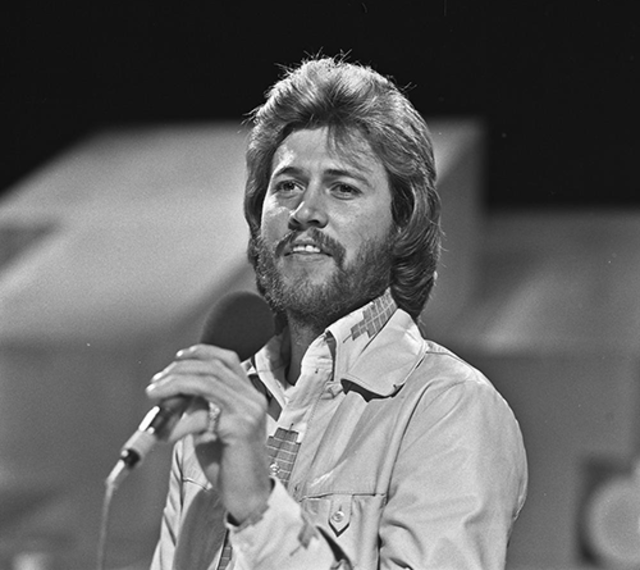
In this essay I will try to defend the honor of Barry Gibb, one of the most parodied figures in U.S. pop music history, who is the main songwriter of the musical equivalent of a silk shirt, maybe a nice pink paisley, marked with sweat stains and the widest lapels imaginable, its pearlescent buttons barely covering a thicket of chest hair laden with gold chains, the sonic equivalent of getting a scalp massage under a gentle stream of lukewarm water before a Thursday afternoon perm. I’m talking about The Bee Gees.
My introduction to the kings of white-boy disco came when I was a 10-year-old girl growing up in suburban Milwaukee. My parents got me a Yamaha keyboard and signed me up for piano lessons with Mrs. Schuett, a nice old lady in the neighborhood. The purchasing of the Yamaha was a remarkable display of faith in their taciturn daughter’s ability to commit to a single goddamn interest for once in her life. They wouldn’t make the same mistake with such an extravagant purchase again.
We set up the Yamaha on its stand in the dining room, where I spent hours pretending to practice while looking at the cars as they sped past our driveway. I’d sit in front of the Yamaha, desperately plunking out “Giraffes On Parade” or one of the other exceedingly fake songs from one of the songbooks Mrs. Schuett had assigned the week before. The Yamaha came preprogrammed with a slate of lo-fi MIDI versions of a bewildering span of classical and contemporary works, and I would listen to them in moments of desperate procrastination. Bach’s Minuet in G Major and Brahms’ Hungarian Dance No. 5 were favorites; The Blue Danube and Little Brown Jug, not so much. The most contemporary preprogrammed song on the Yamaha was “How Deep Is Your Love” by The Bee Gees. I pressed the button for the first time and heard the first notes whine out from the keyboard’s speakers like a rodent trapped in a car engine. It was the worst song I’d heard in my young life.
Fast forward 20 years, and my husband and I have decided to watch the 1977 movie Saturday Night Fever. I say “decided,” meaning I turned to my husband and said, “I think someone on Twitter said this is actually a good movie???” And he said, “OK.” Reader, it is a great movie. Seriously, go watch it. You won’t regret it. The second star of the movie, after an incandescently Italian John Travolta, is the soundtrack. I mean, my god. It’s so good.
The Saturday Night Fever soundtrack remains the second most popular soundtrack of all time, after Whitney Houston’s soundtrack for The Bodyguard. The Gibb boys wrote seven tracks that appeared in the film, four of which went on to top U.S. charts: How Deep Is Your Love, Stayin’ Alive, Night Fever, and If I Can’t Have You. The best song from the movie (More Than A Woman) never made it to number one because it had to compete with all the other Bee Gees songs from Saturday Night Fever that were topping the U.S. charts at the same time.
“If I Can’t Have You” is pretty repetitive as far as disco songs go, and it wouldn’t stand out if not for Yvonne Elliman, whose vocals lend the track more emotional depth than The Bee Gees probably intended. Elliman grew up in Honolulu in the 1950s, then moved to London, where she sang in bars and nightclubs. One night, Tim Rice and Andrew Lloyd Weber saw her singing at a club, and asked her to audition for the role of Mary Magdalene in Jesus Christ Superstar. In 2008, Elliman was among the hundreds of musicians whose tapes were destroyed in a studio fire at Universal Music Group.
I’d argue that no one musical act has come to emblemize (?) an entire genre of music in the way that Barry Gibb and The Bee Gees did. You simply can’t have disco as we know it without The Bee Gees, and you can’t have The Bee Gees without B.G. himself. The Bee Gees were popular music in the late seventies in the same way The Beatles were popular music in the first half of the sixties. Of course, The Beatles and The Bee Gees were only able to ascend to such heights by doing the same thing every white pop star before and after them did: ripping off Black artists to make a watered-down version of Black music that white audiences found more palatable.
The Bee Gees aren’t exactly alone in their role as white musicians who found success by copying Black artists. Still, I’ve grown to appreciate the Bee Gees Since since my first exposure to them. I love how unapologetically them they are, which is to say: a bunch of white guys making easy listening music that you have to admit is also pretty danceable. Over the course of his long musical career, Barry Gibb never tried not being corny. You’ve got to give him some credit for that. It’s his way of reassuring us that sometimes, it’s okay to not try so hard. It’s usually not that deep.
Previous Monday Songs:
Runaway
Age of Consent
First Light
